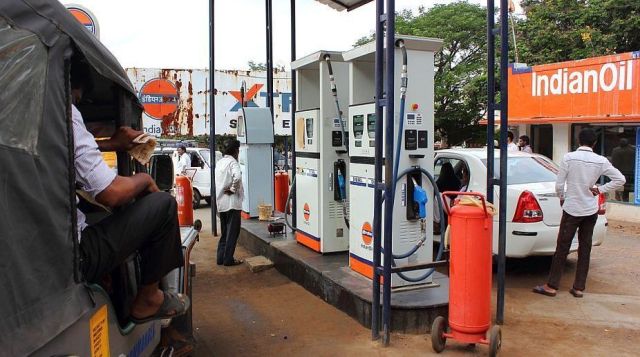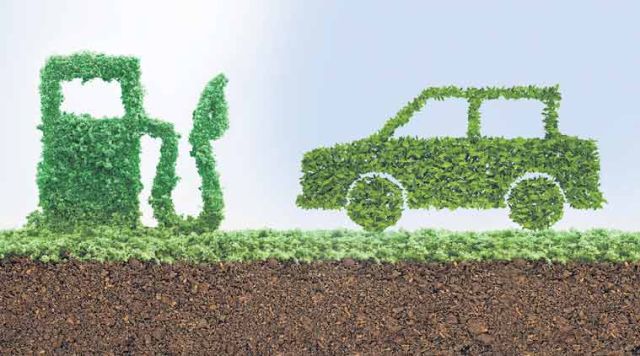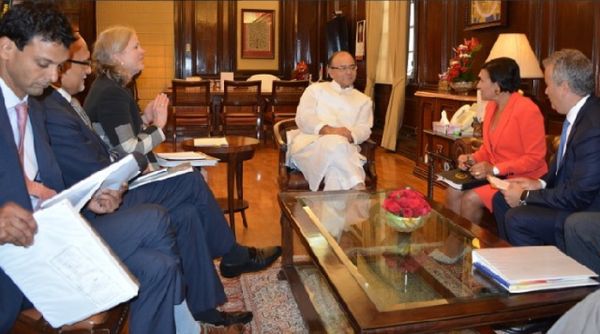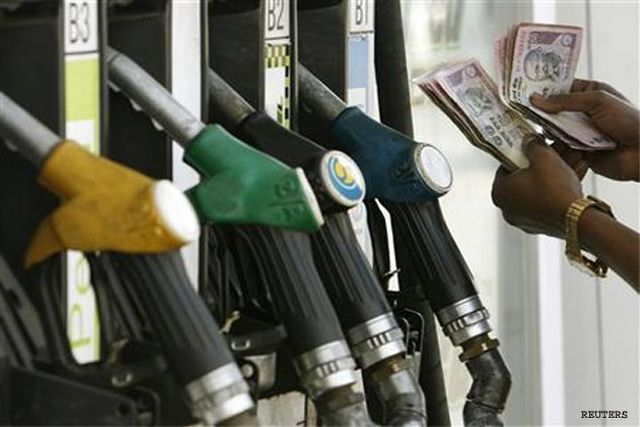
by admin | May 25, 2021 | Commodities, Commodities News, Corporate, Corporate Buzz, Economy, Markets, News
 New Delhi : Petrol prices approached a three-and-a-half-year high in Delhi on Thursday at Rs 73.05 per litre.
New Delhi : Petrol prices approached a three-and-a-half-year high in Delhi on Thursday at Rs 73.05 per litre.
The previous high in the national capital was Rs 73.60 a litre in July 2014, data from the Indian Oil Corp showed.
On Wednesday, price of petrol in the city was Rs 72.92 per litre.
In the other key metros of Kolkata, Mumbai and Chennai, petrol prices reached landmark levels on Thursday with prices at Rs 75.74, Rs 80.91 and Rs 75.77 per litre.
The previous highs in the cities were Rs 76.14 (Kolkata, August 2014), Rs 81.75 (Mumbai, July 2014) and Rs 75.78 (Chennai, August 2014).
On Wednesday, prices were at Rs 75.62, Rs 80.79 and 75.63 per litre in Kolkata, Mumbai and Chennai respectively.
Similarly, diesel prices have been hitting record levels every day for almost two weeks now. The trend continued on Thursday.
In Delhi, diesel was sold at Rs 64.11 per litre. In Kolkata, Mumbai and Chennai, the fuel was priced at Rs 66.78, Rs 68.27 and Rs 67.62 per litre respectively.
On Wednesday, prices of diesel were at Rs 64.00 (Delhi), Rs 66.67 (Kolkata), Rs 68.25 (Mumbai) and Rs 67.50 (Chennai) per litre.
Global and domestic factors have spiked the fuel prices. Production curbs by the Organisation of the Petroleum Exporting Countries and high demand have led to the surge. On Thursday, price of the Brent crude oil was around $69 per barrel.
—IANS

by admin | May 25, 2021 | Business, Economy, Markets, News
 New Delhi : The Bureau of Indian Standard (BIS) has revised the Indian standards on petrol (IS 2796) and diesel (IS 1460) as per BS VI fuel norms, an official statement said here on Wednesday.
New Delhi : The Bureau of Indian Standard (BIS) has revised the Indian standards on petrol (IS 2796) and diesel (IS 1460) as per BS VI fuel norms, an official statement said here on Wednesday.
So far, these standards covered fuel requirements based on emission norms upto BS IV.
With a view to conserve natural resources as well as to reduce pollution, government has decided to implement BS VI emission norms in Delhi NCR from April 1, 2018. In rest of the country these will be implemented from April 1, 2020.
“The revised standards will improve the environment and reduce respiratory problems due to reduction in permissible sulphur content which will also reduce emission of nitrogen oxides,” the statement said.
These standards also permit increased blending of ethanol in petrol and bio-diesel in diesel which will help in conservation of natural resources and reduction in import of crude.
—IANS

by admin | May 25, 2021 | Corporate, Corporate Governance, News
 By Aparajita Gupta,
By Aparajita Gupta,
New Delhi : Aiming to give a major push to digital drive, the government is planning to put petrol and
diesel along with its various products on e-commerce platform.
But is it a feasible idea?
Domain experts say it is feasible but high safety measures need to be adopted.
“Can we connect oil with IT and telecommunications? We plan to put all petroleum products on e-commerce platform,” Oil Minister Dharmendra Pradhan said while addressing at the recent India Mobile Congress here.
According to reports, the idea was first floated by Pradhan at a consultative committee meeting of Members of Parliament in Srinagar on April 21.
“It is technically feasible to offer petrol on e-commerce sites and later get it delivered at doorsteps. But it has to be sealed properly and should be handled in a delicate manner. The need for emergency supplies can be met through this channel. It may become a popular product in rural areas where for miles there are no fuel pumps,” Deepak Mahurkar, leader, oil and gas at PricewaterhouseCoopers India told IANS.
Former ONGC Chairman and Managing Director R.S.Sharma also said it’s a workable idea, but emphasised that safety standards should be maintained.
“It is a technically feasible project. It can become highly commercially scaleable model. But safety is a major concern,” Sharma told IANS.
Sharma who is also Chairman of Ficci Hydrocarbon Committee suggested that similar safety measures as petrol pumps should be adopted by delivery persons while pouring petrol into any vehicle.
Industry experts also raised concerns about the price of petrol that will be charged by the e-commerce platforms. They may charge a service fee as fuel will be delivered at doorsteps. On the other hand, if big players com in they might even cut price, trying to gain more market share.
There are around 60,000 fuel retail outlets in India. The size of the entire petroleum industry is aorund Rs 6.5 lakh crore.
On average, 40 million consumers come to retail outlets across the country on a daily basis. If petrol is offered online, then it will surely ease pressure on these retail outlets.
“Technically it is possible. But it has to have a proper dispensing norm. It needs to stick to the norms set by the Petroleum and Explosives Safety Organisation (PESO) to meet safety. Given the way retailing space is becoming precious, e-commerce route can be an alternative route,” Anish De, Partner, infrastructure, government and healthcare and Leader, oil and gas, at KPMG in India told IANS.
He said the concept is likely to gain traction in urban areas too as there are few petrol pumps in the heart of many cities and urbanisation is happening fast.
(Aparajita Gupta can be contacted at aparajita.g@ians.in)
—IANS

by admin | May 25, 2021 | Commodities, Commodities News, Corporate, Corporate Governance, Economy, News, Politics
 New Delhi : Finance Minister Arun Jaitley will soon write to all state Chief Ministers urging them to cut sales tax, or value added tax (VAT), on petrol an diesel, Petroleum Minister Dharmendra Pradhan said on Wednesday.
New Delhi : Finance Minister Arun Jaitley will soon write to all state Chief Ministers urging them to cut sales tax, or value added tax (VAT), on petrol an diesel, Petroleum Minister Dharmendra Pradhan said on Wednesday.
“We have proactively cut excise duty. Now it is the turn of states to reduce VAT,” he said.
Noting that states impose VAT ranging from 26 per cent to 38 per cent on fuel, the minister added: “I urge all states to reduce VAT by 5 per cent in line with the cut in central excise duty to provide farmers and consumers with one more slab of relief.”
Under all round attack on rising fuel prices, the government on Tuesday decided to slash the excise duty on petrol and diesel by Rs 2 per litre — effective Wednesday — to cushion the impact of rise in international crude prices, in a decision that will cost the central exchequer Rs 13,000 crore during the remaining part of the fiscal.
Earlier, due to the increase in the international prices of petrol and diesel during the last few weeks, the retail selling prices of petrol and diesel in Delhi had risen to Rs 70.83 a litre and Rs 59.07 per litre, respectively, as on October 2.
Pradhan said the Centre has sacrificed Rs 26,000 crore in revenue in the cut in excise duty.
“States are the biggest beneficiaries. They get all of the VAT collection plus they also get 42 per cent of the central excise collections. The amount remaining with the Centre is used to finance centrally sponsored schemes in states,” he said.
As a result of the excise duty reduction, petrol price has been cut by Rs 2.50 per litre and that of diesel by Rs 2.25, he added.
Under the daily pricing regime for transport fuels, petrol in Delhi on Wednesday was costing Rs 68.38 a litre and diesel Rs 56.89.
Announcing the excise cut, the government said the rise in the prices of petrol and diesel is also reflected in WPI, or wholesale, inflation, which has increased to 3.24 per cent for the month of August 2017, as compared to 1.88 per cent for the month of July 2017, and which prompted the government to act swiftly.
Last month, petrol prices in Mumbai, for instance, crossed levels they had touched before the Narendra Modi government took charge in 2014. In response to criticism on rising fuel prices, Petroleum Minister Dharmendra Pradhan clarified that the excise revenues served for spending on social development schemes.
Despite demands from industry, petroleum products, as well as natural gas, do not come under the Goods and Services Tax (GST) regime. These continue to be taxed as per the old VAT regime.
—IANS

by admin | May 25, 2021 | Corporate, Corporate Governance, Economy, Markets, News, Politics
 New Delhi : Under all round attack on rising fuel prices, the government on Tuesday decided to slash the excise duty on petrol and diesel by Rs 2 per litre — effective Wednesday — to cushion the impact of rise in international crude prices, in a decision that will cost the exchequer Rs 13,000 crore during the remaining part of the fiscal.
New Delhi : Under all round attack on rising fuel prices, the government on Tuesday decided to slash the excise duty on petrol and diesel by Rs 2 per litre — effective Wednesday — to cushion the impact of rise in international crude prices, in a decision that will cost the exchequer Rs 13,000 crore during the remaining part of the fiscal.
In effect, the government decision could act as a check against retail prices going up in case global crude rates rise.
“The Government of India has decided to reduce the basic excise duty rate on petrol and diesel [both branded and unbranded] by Rs 2 per litre with effect from 4th October, 2017,” a Finance Ministry statement here said.
“This decision has been taken by the government in order to cushion the impact of rising international prices of crude petroleum oil and petrol and diesel on retail sale prices of petrol and diesel, as well as to protect the interest of common man,” the statement said.
“The revenue loss on account of these reductions in excise duty is about Rs 26,000 crore in a full year, and about Rs 13,000 crore during the remaining part of the current financial year,” it said.
Earlier, due to the increase in the international prices of petrol and diesel during the last few weeks, the retail selling prices of petrol and diesel in Delhi have risen to Rs 70.83 a litre and Rs 59.07 per litre, respectively, as on October 2.
This rise in the prices of petrol and diesel is also reflected in WPI inflation, which has increased to 3.24 per cent for the month of August 2017, as compared to 1.88 per cent for the month of July 2017, which prompted the government to act swiftly, it added.
Opposition parties have been critical of the government that petrol prices have been ruling high and it has not cut excise on fuels despite international prices rising recently.
When crude prices were falling dramatically over the last two years, the government, since 2015, hiked excise on petrol by Rs 12 a litre, and on diesel by over Rs 13, in instalments.
Last month, petrol prices in Mumbai, for instance, crossed levels it had touched before the Narendra Modi government took charge in 2014. In response to criticism on rising fuel prices, Petroleum Minister Dharmendra Pradhan clarified that the excise revenues served for spending on social development schemes.
He also ruled out any change in the present system of market-determined pricing.
—IANS

 New Delhi : Petrol prices approached a three-and-a-half-year high in Delhi on Thursday at Rs 73.05 per litre.
New Delhi : Petrol prices approached a three-and-a-half-year high in Delhi on Thursday at Rs 73.05 per litre.



